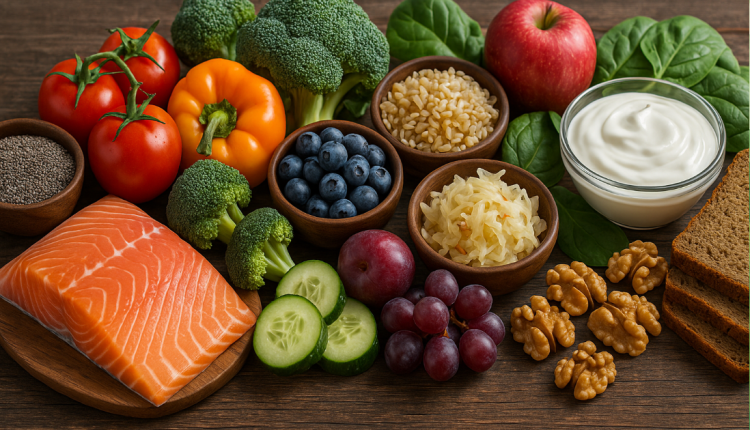In recent years, the intricate relationship between diet and mental health has garnered significant attention from researchers and healthcare professionals alike. The concept of the “gut-brain axis” has emerged as a pivotal area of study, highlighting the bidirectional communication between the gastrointestinal tract and the central nervous system. This connection underscores the profound impact that dietary choices can have on cognitive function, mood regulation, and overall mental well-being.
Understanding the Gut-Brain Axis
The gut-brain axis refers to the complex network of communication pathways that link the enteric nervous system of the gastrointestinal tract with the central nervous system. This bidirectional communication is facilitated through neural, hormonal, and immunological signaling mechanisms. Central to this axis is the gut microbiota—a diverse community of microorganisms residing in the digestive tract—which plays a crucial role in modulating brain function and behavior.
Emerging evidence suggests that the composition and diversity of the gut microbiota can influence neurotransmitter production, inflammatory responses, and the integrity of the blood-brain barrier. Disruptions in this delicate balance have been associated with various neuropsychiatric disorders, including depression, anxiety, and cognitive decline.
The Role of Diet in Shaping Gut Microbiota
Diet is a primary determinant of gut microbiota composition and function. Nutritional choices can either promote a diverse and balanced microbial community or contribute to dysbiosis—a state of microbial imbalance linked to adverse health outcomes.
Fiber-Rich Foods
Dietary fiber serves as a prebiotic, providing nourishment for beneficial gut bacteria. Consuming a variety of fiber-rich foods, such as fruits, vegetables, legumes, and whole grains, supports microbial diversity and the production of short-chain fatty acids (SCFAs). SCFAs, including butyrate, propionate, and acetate, have anti-inflammatory properties and play a role in maintaining the integrity of the gut lining.
Fermented Foods
Fermented foods, such as yogurt, kefir, sauerkraut, kimchi, and kombucha, are rich sources of probiotics—live microorganisms that confer health benefits when consumed in adequate amounts. Incorporating these foods into the diet can enhance the abundance of beneficial bacteria, potentially improving mood and cognitive function.
Omega-3 Fatty Acids
Omega-3 fatty acids, particularly eicosapentaenoic acid (EPA) and docosahexaenoic acid (DHA), have been shown to exert anti-inflammatory effects and support neuronal health. Fatty fish, such as salmon, mackerel, and sardines, are excellent sources of these essential fats. Regular consumption of omega-3-rich foods may mitigate symptoms of depression and anxiety.
Polyphenol-Rich Foods
Polyphenols are bioactive compounds found in plant-based foods, including berries, tea, coffee, dark chocolate, and certain spices. These compounds exhibit antioxidant and anti-inflammatory properties and can modulate the gut microbiota by promoting the growth of beneficial bacteria. A diet abundant in polyphenol-rich foods may contribute to improved mental health outcomes.
Diet and Mental Health: Evidence from Research
A growing body of research supports the link between dietary patterns and mental health. Observational studies and clinical trials have explored the impact of various diets on psychological well-being.
Mediterranean Diet
The Mediterranean diet, characterized by high consumption of fruits, vegetables, whole grains, legumes, nuts, olive oil, and moderate intake of fish and poultry, has been associated with a reduced risk of depression and cognitive decline. Its emphasis on nutrient-dense, anti-inflammatory foods supports gut health and may positively influence mood and cognition.
Western Diet
In contrast, the Western diet—high in processed foods, refined sugars, saturated fats, and low in fiber—has been linked to increased inflammation and a higher prevalence of mood disorders. This dietary pattern may contribute to dysbiosis and impair the gut-brain axis, negatively affecting mental health.
Specific Nutrients
Certain nutrients have been identified as critical for mental health:
- B Vitamins: Vitamins B6, B9 (folate), and B12 are involved in neurotransmitter synthesis and homocysteine metabolism. Deficiencies in these vitamins have been associated with depression and cognitive impairment.
- Vitamin D: Adequate vitamin D levels are essential for brain development and function. Low levels have been linked to mood disorders and increased risk of depression.
- Magnesium: This mineral plays a role in neurotransmission and has been implicated in the regulation of mood. Magnesium deficiency may contribute to anxiety and depressive symptoms.
Practical Dietary Recommendations for Mental Well-being
Adopting dietary habits that support gut health can have a positive impact on mental well-being. Consider the following strategies:
- Increase Fiber Intake: Aim to consume a variety of fiber-rich foods daily to promote microbial diversity and SCFA production.
- Incorporate Fermented Foods: Include fermented products in your diet to introduce beneficial probiotics that support gut-brain communication.
- Choose Healthy Fats: Opt for sources of omega-3 fatty acids, such as fatty fish, flaxseeds, and walnuts, to reduce inflammation and support neuronal health.
- Limit Processed Foods: Reduce intake of processed and high-sugar foods that can disrupt gut microbiota balance and contribute to inflammation.
- Ensure Adequate Micronutrient Intake: Monitor and maintain sufficient levels of essential vitamins and minerals through a balanced diet or supplementation as needed.
Conclusion
The intricate interplay between diet, gut microbiota, and mental health underscores the importance of nutritional choices in promoting psychological well-being. By fostering a diverse and balanced gut microbiome through mindful eating practices, individuals can support the gut-brain axis and potentially mitigate the risk of mood disorders and cognitive decline. As research in this field continues to evolve, embracing dietary patterns that prioritize gut health may serve as a valuable component of holistic mental health strategies.


